 Sir Richard Branson will be slamming the virtual champagne against the good ship Virgin Digital UK as another digital music service slides down the slipway on September 2nd.
Sir Richard Branson will be slamming the virtual champagne against the good ship Virgin Digital UK as another digital music service slides down the slipway on September 2nd.
Virgin’s new service will serve up over a million tracks, available to punters through a subscription and a download service.
Subscriptions will start from 40p (~US$0.70, €0.58~) each day, with permanent downloads costing 79p (~US$1.15, €1.4~) upwards, but Ipod owners needn’t apply as the service uses Windows Media, which goes together with iPods like chocolate and cabbage.
Sir Richard Branson, ubermensch of the Virgin Group, set his PR spin machine to eleven: “With a strong music heritage behind us, as a record label and a retailer, Virgin has a huge advantage, and platform to launch a digital service that will become the ultimate destination to buy, stream, burn and enjoy the best the music world has to offer.”
In an already crowded digital download marketplace dominated by iTunes, digital music services are hard-pushed to dream up compelling USPs, but Virgin claim that their service aims to “redefine” the digital music experience with a wallet-opening combination of features and consumer elements.
 Virgin Digital UK is set to serve up a mix of digital music store, music club subscription service, streaming radio, powerful digital music and portable device management tools, along with a collection of music-discovery gizmos.
Virgin Digital UK is set to serve up a mix of digital music store, music club subscription service, streaming radio, powerful digital music and portable device management tools, along with a collection of music-discovery gizmos.
Developed in-house, the service is a collaboration between Virgin and US digital music provider Music Net and ramps up the feature set with additional track info, musical recommendations with phonetic search, comprehensive artist biographies and a ‘Related Artists’ feature which serves up information about the influences, collaborations and recommendations of similar artists.
To big up the launch of the service, Virgin will host exclusive performances from Bloc Party, The Dandy Warhols and The Cribs on September 2nd, with another 150 London-wide live performances in the pipeline, providing exclusive content to the Virgin Digital site.
Virgin are offering two subscription services; Basic £9.99 (~US $17.8, €14.6~) or Premium £14.99 (~US$26.7, €22~), with individual tracks available from 79p (~US$1.15, €1.4~) per song.
 Samsung will be debuting the world’s first 19″ notebook, the Samsung M70, on 2 September at the IFA Consumer Electronics Show in Berlin.
Samsung will be debuting the world’s first 19″ notebook, the Samsung M70, on 2 September at the IFA Consumer Electronics Show in Berlin.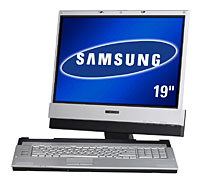 This lets users detach the laptop’s screen and place it in a dock to give the appearance of a conventional desktop.
This lets users detach the laptop’s screen and place it in a dock to give the appearance of a conventional desktop.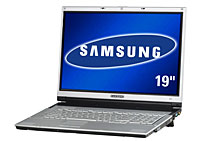 Despite the added complexity and enormous screen size, Samsung have claimed that the laptop will weigh no more than their current 17-inch notebook so it should be vaguely portable (if you work out at the gym).
Despite the added complexity and enormous screen size, Samsung have claimed that the laptop will weigh no more than their current 17-inch notebook so it should be vaguely portable (if you work out at the gym).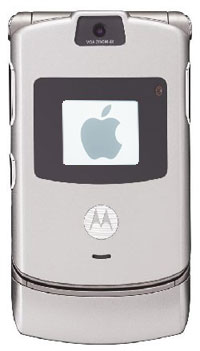 After enjoying huge success with the iPod, mini iPod and photo iPod, Apple are looking to score another hit with consumers with the expected announcement of the iPhone, a music playing mobile phone.
After enjoying huge success with the iPod, mini iPod and photo iPod, Apple are looking to score another hit with consumers with the expected announcement of the iPhone, a music playing mobile phone.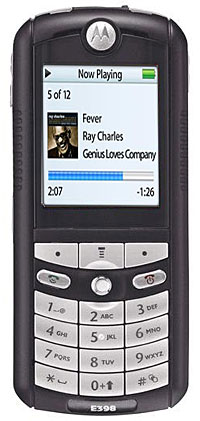 Thomas Husson, a mobile analyst with Jupiter Research, had some doubts: “It’s been awaited for a year, if not more. That means people might be disappointed, because I don’t think it will be much more than a phone that can play music – and there are already others on the market that can do that. But iTunes and iPod are quite famous now in the music space, and they will be hoping for leverage.”
Thomas Husson, a mobile analyst with Jupiter Research, had some doubts: “It’s been awaited for a year, if not more. That means people might be disappointed, because I don’t think it will be much more than a phone that can play music – and there are already others on the market that can do that. But iTunes and iPod are quite famous now in the music space, and they will be hoping for leverage.” The acceptance of VoIP into the mainstream moved up a gear today with the release of a DECT VoIP handset, the plain-badly-named EV5203-C, from Thomson, the _huge_ French all-encompassing media company. The product is the first fruit from Thomson’s purchase of Inventel, earlier this year.
The acceptance of VoIP into the mainstream moved up a gear today with the release of a DECT VoIP handset, the plain-badly-named EV5203-C, from Thomson, the _huge_ French all-encompassing media company. The product is the first fruit from Thomson’s purchase of Inventel, earlier this year. However, he did manage to mention a couple of issues which aren’t directly about himself. For example, he said the following in regard to EPG’s, searching and the gateways to information – this is already a fundamental issue for regulators and one where we all need to pay close attention as to how they look to regulate…
However, he did manage to mention a couple of issues which aren’t directly about himself. For example, he said the following in regard to EPG’s, searching and the gateways to information – this is already a fundamental issue for regulators and one where we all need to pay close attention as to how they look to regulate… Elvis Charges Mobile Phones
Elvis Charges Mobile Phones Nearly 40% of Mobiles Bought By US Teens For Texting
Nearly 40% of Mobiles Bought By US Teens For Texting A Feast Of Firefox Facts
A Feast Of Firefox Facts Straight out of the text book of Thinly Veiled Product Placement Exercises comes this featherlight-fluff from StreamShield, who commissioned a survey asking the vital question: “Are women more sensible surfers?”
Straight out of the text book of Thinly Veiled Product Placement Exercises comes this featherlight-fluff from StreamShield, who commissioned a survey asking the vital question: “Are women more sensible surfers?”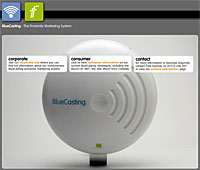 Bluetooth enabled billboards may soon be bothering passers-by with wireless advertisements blasted to mobile phones, according to the New Scientist magazine.
Bluetooth enabled billboards may soon be bothering passers-by with wireless advertisements blasted to mobile phones, according to the New Scientist magazine. Trials took place recently at six London railway stations in partnership with the advertising company Maiden Group, with Bluetooth-equipped posters offering to beam promotional material and song clips from Coldplay’s new album to passers-by.
Trials took place recently at six London railway stations in partnership with the advertising company Maiden Group, with Bluetooth-equipped posters offering to beam promotional material and song clips from Coldplay’s new album to passers-by. This beams the adverts to anyone within 100m of the billboard with Simon O’Regan, Filter UK’s Technical Officer insisting that, “only people who can see the billboard are offered the additional promotion.”
This beams the adverts to anyone within 100m of the billboard with Simon O’Regan, Filter UK’s Technical Officer insisting that, “only people who can see the billboard are offered the additional promotion.”